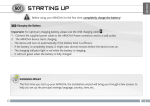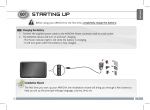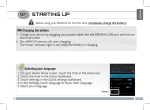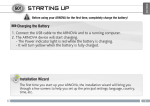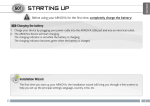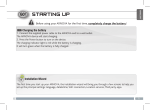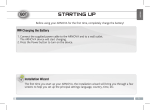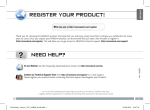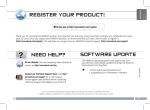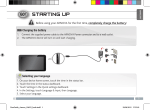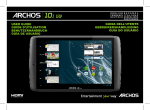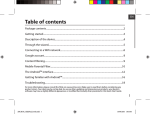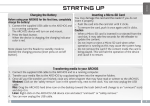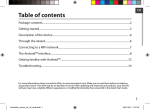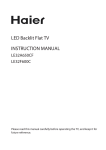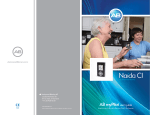Download Arnova ChildPad Operating Instructions
Transcript
ENGLISH ! ▲ STARTING UP Before using your ChildPad for the first time, completely charge the battery! Charging the Battery Important: For optimum charging battery, please use the USB charging cable . 1. Connect the supplied power cable to the ChildPad Power connector and to a wall outlet. 2. The ChildPad device starts charging. -- The device will turn on automatically if the battery level is sufficient. -- If the battery is completely empty, it might take several minutes before the device turns on. -- The charging indicator light is red while the battery is charging. -- It will turn green when the battery is fully charged. Installation Wizard The first time you start up your ChildPad, the installation wizard will bring you through a few screens to help you set up the principal settings: language, country, time, etc. 1 ENGLISH DESCRIPTION OF THE CHILDPAD 1. On/Off button: enables to turn on or turn off the device. 2. Charging indicator: - red light: battery charging - green: battery charged. 1 2 7 3. Micro-SD card slot: to insert a micro-SD card 9 3 4 4. Micro-USB port: 5 - to charge the battery of your ChildPad - to connect your ChildPad to your computer using the 8 6 included USB cable in order to transfer files 5. Headphone jack 6. Hardware Reset: in the event that your ChildPad freezes operation, you can press the “pinhole reset” button by using a sharp object such as a toothpick. 7. Camera 8. Microphone 9. Loudspeaker IMPORTANT: Your device is frozen. You can turn it off. Press the ON/OFF button 1 for 10 seconds or press the reset button. See Hardware Reset 6 . 2 ??? CONNECTING TO THE WIFI NETWORK ENGLISH www For this procedure to work, you need to be in a WiFi zone that will allow you to connect to it. Every time the ChildPad is in range of a network that you have already configured once, it will attempt to make a connection. How to configure a WiFi network From the status bar, at the bottom right hand of the screen, you can access the WiFi settings quickly. 1. Touch the time in the status bar. The status dashboard is displayed. 2. Touch the time in the status dashboard. The setting dashboard is displayed below. 3. Touch WiFi to open the WiFi settings. 4. If the WiFi is off, slide the WiFi switch to the On position. Once the WiFi is on, the ChildPad will scan for available WiFi networks. Secured networks are indicated with a Lock icon. If the device finds a network that you connected to previously, it connects to it. 5. Touch the network you want to connect to. 6. Enter the required network information* and touch Connect. We recommend that you select Show password in order to be able to see the characters you are typing. Your ChildPad will attempt to establish a connection to that WiFi access point. * For free access WiFi points, there is no need to enter any special information. For secured networks, you will need either a key (a series of numbers and/or letters) of the type WEP, WPA, or WPA2. To obtain the exact connection parameters required, contact the Internet service provider. 3 ENGLISH THE CHILDPAD INTERFACE These are Childpad applications. Tap on an icon to open the corresponding application. You can customize the Home screen by adding/ removing shortcuts and widgets, changing the wallpaper etc. See next page. Your ChildPad device is equipped with a capacitive touchscreen. Use your fingertip to navigate. The navigation bar displays the Back, Home and Recent Apps buttons. Main Touchscreen buttons The Back button - to go back to your previous screen. The Home button - to return to the main screen. The Recent Apps button - to navigate among your apps. - to remove a thumbnail from the list, swipe it left or right. 4 All apps button Tap on this icon to reveal all the Android™ applications and widgets installed on your ChildPad (games, various tools, etc.). You can copy them onto the Home screen. You can get more Android™ applications from AppsLib . The status bar displays notifications and system icons. The Search button - to type terms to search your tablet and the web. The All apps button - to find all your apps and widgets. ENGLISH CUSTOMIZING YOUR CHILDPAD The extended Home screen Navigate between different home screen panels by swiping left and right. Customizing the Home screen panels -- To change your wallpaper, hold your finger on the screen at an empty location, then choose from the list. Arranging & working with apps -- To move a Home screen item, touch and hold your finger onto it until the positioning gridlines appear, then slide it to the desired location, and release your finger. -- To remove a Home screen item, touch and hold it, slide your finger towards the top of the screen and drop it over the Remove icon. Removing an item from the All apps screens will uninstall the item. Pinch: In some apps (such as Browser, and Gallery), you can zoom in and out by placing two fingers on the screen at once and pinching them together (to zoom out) or spreading them apart (to zoom in). Creating application folders: you can combine several application icons in a folder. Drop one app icon over another on a Home screen and the two icons will be combined. Changing the Settings Tap on Settings and choose a menu among these categories: Wireless & networks, Device, Personal, System. Adding more applications with APPSLIB : with the ChildPad connected to the Internet, tap on the AppsLib icon . This online library has thousands of applications to download and use. 5 ENGLISH CUSTOMIZING YOUR CHILDPAD Add widgets Use the lock screen Widgets are like windows into your apps. They’re available from an All To protect personal information, you can Apps tab for you to move onto your Home screens. adjust your tablet’s lock settings: To see your widgets: 1. Touch the All Apps icon on your Home screen. 2. Touch Widgets at the top of the screen. 3. From the main Widgets screen, you can: -- move between screens: Swipe left or right. -- drag a widget to a Home screen. Touch and hold the widget’s icon, slide your finger where you want to place it and lift your finger. You may be asked to make further choices before the widget activates. If there isn’t room where you have dropped it, the widget won’t be added to the Home screen. 1. From the Home or All Apps screen, touch the Settings icon . 2. Scroll down and touch Security. 3. Touch Screen lock. 4. Touch the type of lock you’d like to use. After you set a lock here, a lock screen is displayed whenever your screen wakes up, requesting the pattern, PIN or other specified key. Extend the life of your battery -- If you aren’t using WiFi, use the Settings app to turn it off. -- Turn down screen brightness and set a shorter Sleep timeout: Settings > Device > Display. -- If you don’t need it, turn off automatic syncing for all apps: Settings > Personal > Accounts & sync. Note that this means you need to sync manually to collect messages, email, and other recent information, and won’t receive notifications when updates occur. 6 ENGLISH TRANSFERRING MEDIA For Windows: note that the below procedure requires at least Windows XP and Windows Media Player 11. 1. Connect your tablet to your computer using the USB cable. Your device is automatically detected. It appears as an icon on “My Computer”. 2. You can transfer your media files to the ChildPad by copy/pasting them into the respective folders. 3. Once all your file transfers are finished, close any program that may have read or written to the ChildPad. 4. You can now unplug the USB cable. For Macintosh: You first need to install the free Android File Transfer application (not included). Download from http://www.android.com/filetransfer. After you install Android File Transfer, follow these steps: 1. If you are using Android File Transfer for the first time, double-click it to open it. After you start Android File Transfer once, it opens automatically whenever you connect your device to your computer. 2. Connect your device to your computer with a USB cable. Android File Transfer starts, if it’s not already running, and opens a window that displays the contents of your device, along with storage space details at the bottom of the window. 3. You can transfer your media files to the ChildPad by copy/pasting them into the respective folders. 4. Once all your file transfers are finished, close any program that may have read or written to the ChildPad. 5. You can now unplug the USB cable. For Linux: You need to install MTP tools (not included). 7 ENGLISH www REGISTER YOUR CHILDPAD! ÄÄ On the web at http://Arnovatech.com/register We recommend that you take a few minutes to register it (http://Arnovatech.com/register). This will allow you to get access to ChildPad technical support (http://Arnovatech.com/support). ? NEED HELP? On our Website: see the Frequently Asked Questions section on http://Arnovatech.com/faq Contact our Technical Support Team: visit http://Arnovatech.com/support for e-mail support. Please register your product before contacting Technical Support (see Register your Product). As we are often updating and improving our products, your device’s software may have a slightly different appearance or modified functionality than presented in this Quick Start Guide. 8 ENGLISH PARENTAL CONTROL In order to activate Mobile Parental Filter on your child’s tablet, launch its browser, then click on the reminding icon (see picture) and follow the online activation instructions. Later on, you will be able to change filter settings: -- on the tablet itself, by clicking on the Mobile Parental Filter Icon -- online, from any other other connected equipment, at the address: http://childpad.profiltechnology.com 9 10 Avant d’utiliser votre ChildPad pour la première fois, chargez complètement sa batterie ! Charger la batterie FRANÇAIS ! ▲ PREMIÈRE UTILISATION Important : pour assurer une charge optimale de la batterie, utilisez le câble USB dédié au chargement . 1. Branchez le câble d’alimentation fourni sur le connecteur d’alimentation du ChildPad et sur une prise secteur. 2. Votre ChildPad commence à se charger. -- L’appareil s’allume automatiquement si le niveau de la batterie est suffisant. -- Si la batterie est totalement vide, il va falloir plusieurs minutes de chargement avant que l’appareil ne s’allume. -- Le témoin de charge est rouge lorsque la batterie est en charge. -- Il est vert lorsque la batterie est complètement chargée. Assistant d’installation La première fois que vous allumez le ChildPad, l’assistant d’installation vous aide à configurer les principaux réglages de l’appareil : la langue, le pays, l’heure, etc. 11 FRANÇAIS DESCRIPTION DU CHILDPAD 1. Bouton On/Off : permet d’allumer ou d’éteindre l’appareil. 2. Témoin de charge : - rouge signifie batterie en charge 1 - vert signifie batterie chargée. 3. Emplacement pour carte Micro-SD : pour insérer une carte4 23 9 Micro-SD 5 4. Port micro-USB : 6 - permet de charger l’appareil, - permet de connecter votre ChildPad à un ordinateur, à l’aide du câbleUSB fourni afin de transférer des fichiers. 5. Prise casque 6. Réinitialisation de l’appareil : si votre ChildPad venait à se bloquer totalement, vous pouvez appuyer sur le bouton reset en utilisant un objet pointu tel qu’un trombone. 7. Caméra 8. Microphone intégré 9. Haut-parleur IMPORTANT: votre produit ne réagit plus. Vous pouvez l’arrêter en actionnant pendant 10 secondes le bouton ON/ OFF 1 ou en utilisant le bouton de réinitialisation (reset). Voir Réinitialisation de l’appareil 6 . 12 7 8 ??? www SE CONNECTER À UN RÉSEAU WIFI Comment configurer un réseau WiFi A partir de la barre de statut, dans le coin inférieur droit de l’écran, vous pouvez accéder rapidement aux paramètres WiFi. 1. Touchez l’heure dans la barre de statut. Le panneau des statuts s’affiche. 2. Touchez l’heure dans le panneau des statuts. Le tableau des paramètres s’affiche. 3. Touchez WiFi pour afficher les paramètres WiFi. 4. Si le WiFi est désactivé, faites glisser le bouton WiFi sur Marche. Lorsque le WiFi est activé, le ChildPad recherche les réseaux WiFi disponibles. Les réseaux sécurisés sont associés à un icone représentant un cadenas. Si l’appareil détecte un réseau que vous avez utilisé précédemment, il s’y connecte. 5. Sélectionnez le réseau auquel vous souhaitez vous connecter. 6. Saisissez les informations réseaux demandées*, puis touchez Connecter. Il est conseillé de sélectionner Afficher le mot de passe pour afficher les caractères saisis. Votre ChildPad va maintenant tenter d’établir une connexion avec le point d’accès WiFi. FRANÇAIS Pour suivre cette procédure, vous devez vous situer dans une zone WiFi vous permettant de vous connecter. Chaque fois que le ChildPad détectera un réseau que vous avez déjà configuré, il tentera de s’y connecter. * Pour vous connecter à un réseau WiFi ouvert, il n’est pas nécessaire de saisir les informations réseau. Pour un réseau protégé, vous devrez soit entrer une clé (une suite de chiffres et/ou de lettres) du type WEP, WPA ou WPA2. Pour obtenir les paramètres de connexion exacts, contacter le fournisseur d’accès à Internet. 13 FRANÇAIS L’INTERFACE DU CHILDPAD Votre ChildPad est équipé d’un écran tactile capacitif. Utiliser Des raccourcis ChildPad la pulpe de votre doigt pour naviguer. Appuyez sur un icone pour ouvrir l’application correspondante. Vous pouvez personnaliser l’écran d’accueil en ajoutant/supprimant des raccourcis et des widgets, en changeant le fond d’écran, etc. Voir page suivante. Icone Toutes les applications Appuyez sur cet icone pour afficher toutes les applications Android™ installées sur votre ChildPad (jeux, différents outils, etc.). Il est possible de les copier sur l’écran d’accueil. Vous pouvez obtenir d’autres applications Android™ depuis AppsLib . La barre de navigation affiche les icones Retour, Accueil et Applications récentes. La barre de statut affiche des notifications et des icones système. Principales boutons tactiles L’icone Retour - retour à l’écran précédent. L’icone Accueil - pour retourner à l’écran d’accueil. L’icone Applications récentes - Pour ouvrir les applications utilisées récemment. Pour fermer une application, faites-la glisser vers la gauche ou vers la droite. 14 L’icone Recherche - pour saisir les termes de recherche L’icone Toutes les applications - pour voir tous vos widgets et vos applications. PERSONNALISATION DU CHILDPAD FRANÇAIS L’écran d’accueil étendu Faites glisser votre doigt horizontalement sur l’écran pour aller sur le côté gauche ou droit de l’écran d’accueil étendu. Changer le fond d’écran - Pour changer votre fond d’écran, maintenez votre doigt appuyé sur un emplacement vide de l’écran, puis choisissez parmi la liste d’options. Organiser et utiliser les applications - Pour déplacer un élément, maintenez votre doigt appuyé sur l’icone jusqu’à ce que s’affichent les lignes de positionnement, puis faites-le glisser vers l’emplacement souhaité, et relâchez. - Pour supprimer l’icone d’une application de l’écran d’accueil, maintenez votre doigt appuyé sur l’icone, puis faites le glisser vers le haut de l’écran, et déposez le sur l’icone Supprimer. En supprimant un icone à partir de l’écran Toutes les applications, vous la désinstaller. Zoomer : Dans des applications telles que les navigateurs, vous pouvez zoomer ou dézoomer. Il suffit de placer deux doigts sur l’écran et les écarter pour zoomer ou les rapprocher dans un mouvement de pincement pour dézoomer. Créer des dossiers d’applications : vous pouvez regrouper plusieurs icones d’applications dans un dossier. Dans un écran d’accueil, déposez un icone sur un autre pour les rassembler. Modification des paramètres Appuyez sur Paramètres et choisissez un menu parmi ces catégories : Connexions et réseaux, Appareil, Personnel, Système, etc. Ajouter d’autres d’applications avec APPSLIB Connectez votre ChildPad à un réseau WiFi, puis appuyez sur l’icone AppsLib . Ce portail de téléchargement vous propose des milliers d’applications gratuites et payantes à télécharger. 15 PERSONNALISATION DU CHILDPAD FRANÇAIS Ajouter des widgets Les widgets sont comparables à des fenêtres ouvertes sur vos applications. Vous pouvez les sélectionner dans l’onglet “Toutes les applications”, puis les déplacer vers vos écrans d’accueil. Pour afficher vos widgets, procédez comme suit : 1. Dans l’écran d’accueil, appuyez sur l’icône Toutes les applications . 2. Appuyez sur Widgets en haut de l’écran. 3. Dans l’écran principal des widgets, vous pouvez effectuer les actions suivantes : -- passer d’un écran à l’autre : faites glisser votre doigt vers la gauche ou vers la droite. -- faire glisser un widget jusqu’à un écran d’accueil : appuyez de manière prolongée sur l’icône d’un widget, faites glisser votre doigt jusqu’à l’emplacement de votre choix, puis relevez le doigt. Dans certains cas, vous serez invité à sélectionner d’autres options pour activer le widget. S’il n’y a pas de place à l’emplacement où vous déposez le widget, ce dernier ne sera pas ajouté à l’écran d’accueil. Utiliser le verrouillage écran Pour protéger vos informations confidentielles, vous pouvez modifier les paramètres de verrouillage de votre tablette : 1. Sur l’écran d’accueil ou sur l’écran “Toutes les applications”, appuyez sur l’icône Paramètres . 2. Faites défiler l’écran vers le bas, puis appuyez sur Sécurité. 3. Appuyez sur Verrouillage de l’écran. 4. Appuyez sur le type de verrouillage que vous voulez utiliser. Dès que vous avez sélectionné une option, un écran de verrouillage s’affiche chaque fois que votre écran est réactivé. Vous êtes alors invité à saisir le schéma, le code PIN ou tout autre code spécifié. Prolonger l’autonomie de votre batterie -- Pour désactiver les signaux que vous n’utilisez pas (WiFi), accédez à l’application Paramètres. -- Pour diminuer la luminosité de l’écran et définir un délai de mise en veille plus court, appuyez sur Paramètres > Appareil > Affichage. -- Si vous n’en avez pas besoin, désactivez la synchronisation automatique pour toutes les applications. Pour ce faire, appuyez sur Paramètres > Personnel > Comptes et synchro. Notez que cela signifie que vous devrez effectuer une synchronisation manuelle pour récupérer vos messages, vos e-mails, ainsi que les autres informations récentes. En outre, vous ne recevrez aucune notification pendant les mises à jour. 16 TRANSFERT DE FICHIERS MULTIMÉDIA FRANÇAIS Pour Windows : la procédure décrite ci-dessous nécessite au minimum le système d’exploitation Windows XP et Windows Media Player 11. 1. Connectez votre tablette à votre ordinateur en utilisant le câble USB. Votre appareil est automatiquement détecté. Il s’affiche sous forme d’icone dans “Poste de travail”. 2. Vous pouvez transférer vos fichiers multimédias sur votre ChildPad en les copiant/collant dans les dossiers correspondants. 3. Une fois le transfert de fichiers terminé, fermez tout programme Windows lié au ChildPad. 4. Vous pouvez maintenant déconnecter le câble USB. Pour Macintosh : vous devez tout d’abord installer l’application gratuite Android File Transfer (non fourni). Télécharger la à partir de http://www.android.com/filetransfer. Une fois que vous avez installé Android File Transfer, procédez comme suit : 1. Si vous utilisez Android File Transfer pour la première fois, cliquez deux fois dessus pour l’ouvrir. Après la première utilisation, il s’ouvre automatiquement chaque fois que vous connectez votre appareil à l’ordinateur. 2. Connectez votre appareil à l’ordinateur à l’aide d’un câble USB. L’application Android File Transfer démarre, si elle n’est pas déjà exécutée, et ouvre une fenêtre qui affiche le contenu de votre appareil, ainsi que les informations relatives à l’espace disponible, en bas de celle-ci. 3. Vous pouvez transférer vos fichiers multimédias sur votre ChildPad en les copiant/collant dans les dossiers correspondants. 4. Une fois le transfert de fichiers terminé, fermez tout programme Windows lié au ChildPad. 5. Vous pouvez maintenant déconnecter le câble USB. Pour Linux : vous devez tout d’abord installer MTP tools (non fourni). 17 FRANÇAIS www ENREGISTREZ VOTRE CHILDPAD! ÄÄ Sur Internet : http://Arnovatech.com/register Nous vous conseillons de prendre quelques minutes pour l’enregistrer (http://Arnovatech.com/register). Cela vous permettra d’avoir accès au support technique ChildPad (http://Arnovatech.com/support). ? BESOIN D’AIDE ? Sur notre site Web: Consultez la Foire Aux Questions (FAQ) sur http://Arnovatech.com/faq Contactez notre équipe d’assistance technique: Allez sur http://Arnovatech.com/support pour une assistance par e-mail. Veuillez enregistrer votre produit avant de contacter notre équipe d’assistance technique (voir Enregistrez votre Produit). Comme nous mettons à jour et améliorons régulièrement nos produits, le logiciel de votre appareil peut présenter une interface ou des fonctionnalités légèrement différentes de celles décrites dans ce guide. 18 CONTRÔLE PARENTAL FRANÇAIS Pour activer Mobile Parental Filter sur le ChildPad de votre enfant, démarrez son navigateur Internet, puis cliquez sur l’icône de rappel (voir image) et suivez les instructions de l’activation en ligne. Par la suite vous pourrez configurer le logiciel : -- depuis la tablette, en cliquant sur l’icône Mobile Parental Filter -- à partir de tout autre équipement connecté, sur le site Web http://childpad.profiltechnology.com . 19 20 ! ▲ STARTEN Vor der erstmaligen Verwendung des ChildPad sollte der Akku vollständig aufgeladen werden! Aufladen des Akkus DEUTSCH Wichtig: Für effizientes Laden des Akkus bitte das USB Ladekabel nutzen ! 1. Verbinden Sie das mitgelieferte Stromkabel mit dem ChildPad-Stromanschluss und mit einer Steckdose. 2. Das ChildPad Gerät beginnt zu laden. -- Das Gerät schaltet sich automatisch ein, wenn die Batterie ausreichend aufgeladen ist. -- Wenn die Batterie völlig entladen ist, kann es einige Minuten dauern, bis sich das Gerät einschaltet. -- Während des Ladens der Batterie leuchtet die Ladeanzeige rot. -- Wenn die Batterie voll aufgeladen ist, leuchtet die Ladeanzeige grün. Installationsassistent Wenn Sie Ihren ChildPad das erste Mal in Betrieb nehmen, leitet Sie der Installationsassistent durch einige Bildschirme, um Ihnen dabei zu helfen, die grundlegenden Einstellungen vorzunehmen. Sprache, Land, Uhrzeit usw. 21 BESCHREIBUNG DES CHILDPAD DEUTSCH 1. EIN/AUS-Taste 2. Anzeige Lade-Status: - rote Anzeige: Akku wird geladen 1 - grüne Anzeige: Akku ist geladen 2 9 3. MicroSD Karten Steckplatz 3 4 5 4. Micro USB Port: - zum Aufladen der Batterie Ihres ChildPad 6 - um Verbinden des ChildPad mit dem Computer über das mitgelieferte USB Kabel (zur Datei-Übertragung). 5. Kopfhöreranschluss 6. Hardware-Reset: Falls Ihr ChildPad einmal abstürzt, können Sie die Reset-Taste drücken, indem Sie einen scharfen Gegenstand verwenden, wie z. B. einen Zahnstocher. 7. Webcam 8. Eingebautes Mikro 9. Lautsprecher WICHTIG: Ihr Gerät ist abgestürzt, bitte schalten Sie es aus. Drücken und halten Sie den Ein-/Aus-Taste 1 für 10 Sekunden oder drücken Sie den Reset-Schalter, Hardware-Reset 6 . 22 7 8 ??? www WIFI-NETZWERKVERBINDUNG Dazu müssen Sie sich in Reichweite eines WLAN-Netzwerks befinden. Das ChildPad Gerät erkennt bereits konfigurierte Netzwerke und wird mit diesen eine Verbindung herstellen. DEUTSCH Konfiguration eines WiFi-Netzwerks Von der Statusleiste aus können Sie schnell auf die WiFi-Einstellungen zugreifen. 1. Tippen Sie auf die Uhrzeit in der Statusleiste. Das Status-Dashboard wird angezeigt. 2. Tippen Sie auf die Uhrzeit im Status-Dashboard. Es wird jetzt darunter das Dashboard für Einstellungen angezeigt. 3. Berühren Sie WiFi, um die WiFi-Einstellungen zu öffnen. 4. Bei ausgeschaltetem WiFi schieben Sie den WiFi-Schalter in die Position AN. Nachdem das WiFi eingeschaltet wurde, sucht das ChildPad nach verfügbaren WiFi-Netzwerken. Gesicherte Netzwerke werden mit einem Schlosssymbol angezeigt. Findet das Gerät eine zuvor vorhandene Verbindung, wird diese verwendet. 5. Berühren Sie das Netzwerk, zu dem Sie eine Verbindung herstellen möchten. 6. Geben Sie die erforderlichen Netzwerk-Informationen * ein und berühren Sie Connect (Verbinden). Wir empfehlen, dass Sie Show Password (Passwort anzeigen) wählen, damit Sie die Zeichen, die Sie tippen, sehen können. Ihr ChildPad wird jetzt eine Verbindung zu diesem WiFi-Access-Point herstellen. * Für kostenlose WiFi-Access Points besteht kein Bedarf für das Eingeben spezieller Informationen. Für abgesicherte Netzwerke benötigen Sie entweder einen Schlüssel (eine Serie von Zahlen und/oder Buchstaben) des Typs WEP, WPA oder WPA2. Um die exakten Verbindungsparameter zu erhalten, kontaktieren Sie den Internetprovider. 23 DIE CHILDPAD BENUTZEROBERFLÄCHE DEUTSCH Ihr ChildPad-Gerät ist mit einem Kapazitiven Touchscreen Anzeige von Desktopausgerüstet. Die Bedienung erfolgt durchBerührung des Verknüpfungen von Touchscreens. ChildPad. Tippen Sie auf ein Icon, um die entsprechende Anwendung zu öffnen. Sie können den HomeScreen nach Ihren Wünschen anpassen, indem Sie Shortcuts und Widgets hinzufügen oder entfernen oder das Design des Hintergundes ändern. Auf der Navigationsleiste werden die Tasten Zurück, Startbildschirm und Letzte Apps angezeigt. Alle Apps Symbol Tippen Sie auf dieses Icon, um alle installierten Android™Anwendungen zu sehen (Spiele, verschiedene Tools, usw.). Bei Bedarf können Sie diese Anwendungen auf Ihren Desktop kopieren. Sie finden weitere Android™Anwendungen in AppsLib . Auf der Statusleiste werden Benachrichtigungen und die Systemsymbole angezeigt. Die wichtigsten Touch-Tasten Zurück - Zurück zum vorherigen Bildschirm. Das Suche Symbol -zum Eingeben von Begriffen, nach denen das Tablet und das Startbildschirm - Öffnet den Startbildschirm. Web durchsucht werden sollen. Das Symbol Alle Apps – um alle Ihre Apps Letzte Apps - Öffnet eine Liste mit den Apps, die Sie zuletzt und Widgets anzuzeigen. verwendet haben. Schieben Sie die Miniaturansicht nach links oder rechts, um sie aus der Liste zu entfernen. 24 E ANPASSEN IHRES CHILDPAD Hintergrund ändern - Zum Ändern des Wallpaper den Finger auf eine freie Stelle des Bildschirms legen und dann aus der Liste auswählen. Apps anordnen und verwenden - Zum Bewegen eines Home Screen Elements den Finger darauf legen und so lange halten, bis die Rasterlinien zur Positionierung erscheinen. Dann an die gewünschte Stelle schieben und loslassen. - Wenn Sie ein App-Symbol vom Startbildschirm entfernen möchten, berühren und halten Sie es, bewegen Sie Ihren Finger zum oberen Bildschirmrand und legen Sie die App auf dem Symbol für Entfernen ab. Pinch-to-zoom: Einige Anwendungen lassen sich einfach mit zwei Fingern vergrößern und verkleinern, indem Sie zwei Finger gleichzeitig auf den Bildschirm legen durch Zusammenziehen heraus- oder durch spreizen heranzoomen. DEUTSCH Der erweiterte Desktop Bewegen Sie Ihren Finger horizontal auf dem Touchscreen, um auf die linke oder rechte Seite des Desktops zu gelangen. Erstellen von Ordnern: Sie können mehrere App-Symbole in einem Ordner zusammenfassen. Wenn Sie ein App-Symbol auf einem Startbildschirm auf einem anderen Symbol ablegen, werden die beiden Symbole kombiniert. Einstellungen ändern Tippen Sie auf Einstellungen und wählen Sie aus einer Kategorie: Drahtlos & Netzwerke, Gerät, Nutzer, System. Applikationen hinzufügen - AppsLib: wenn Sie Ihren ChildPad mit dem Internet verbunden haben, tippen Sie auf das AppsLib Symbol . Dieses Online-Portal bietet Ihnen tausende zum Teil kostenlose Apps zum Download. 25 ANPASSEN IHRES CHILDPAD DEUTSCH Widgets hinzufügen Widgets sind wie Fenster für Ihre Apps. Sie können sie über den Tab “Alle Apps” auf Ihre Startbildschirme verschieben. So zeigen Sie Ihre Widgets an: 1. Berühren Sie das Symbol Alle Apps auf Ihrem Startbildschirm. 2. Berühren Sie oben auf dem Bildschirm die Option Widgets. 3. Auf dem Widget-Hauptbildschirm haben Sie folgende Möglichkeiten: -- Zwischen Bildschirmen wechseln: Ziehen Sie den Finger nach links oder rechts. -- Widget auf einen Startbildschirm ziehen: Berühren und halten Sie das Symbol des Widgets, bewegen Sie Ihren Finger an die Position, an der Sie das Symbol ablegen möchten, und heben Sie Ihren Finger an. Unter Umständen müssen Sie weitere Optionen auswählen, bevor das Widget aktiviert wird. Ist an der Stelle, an der Sie das Widget abgelegt haben, nicht genügend Platz, wird es nicht zum Startbildschirm hinzugefügt. Bildschirmsperre verwenden Zum Schutz Ihrer persönlichen Daten können Sie die Sperreinstellungen Ihres Tablets anpassen: 1. Tippen Sie auf dem Startbildschirm oder dem Bildschirm “Alle Apps” auf das Symbol “Einstellungen” . 2. Scrollen Sie nach unten und tippen Sie auf Sicherheit. 3. Tippen Sie auf Display-Sperre. 4. Tippen Sie auf die gewünschte Art der Sperre. Nachdem Sie hier eine Sperre festgelegt haben, wird jedes Mal, wenn Ihr Bildschirm aktiviert wird, ein Sperrbildschirm angezeigt, in dem Sie das Muster, die PIN oder einen anderen definierten Schlüssel eingeben müssen. Akkulaufzeit verlängern -- Falls Sie kein WLAN verwenden, können Sie diesen über die App “Einstellungen” deaktivieren. -- Verringern Sie die Bildschirmhelligkeit und verkürzen Sie das Timeout für den Standby-Modus: Einstellungen > Gerät > Display. -- Deaktivieren Sie die automatische Synchronisierung für alle Apps, wenn Sie diese nicht benötigen: Einstellungen > Nutzer > Konten & Synchronisierung. Beachten Sie, dass Sie ab jetzt eine manuelle Synchronisierung durchführen müssen, um Nachrichten, E-Mails und andere aktuelle Informationen abzurufen. Außerdem erhalten Sie keine Benachrichtigung über aktuelle Updates mehr. 26 ÜBERTRAGEN VON MEDIADATEIEN DEUTSCH Für Windows: Beachten Sie, dass der nachfolgende Vorgang mindestens Windows XP und Windows Media Player 11 erfordert. 1. Verbinden Sie Ihr Tablet mit Ihrem Computer mithilfe des USB-Kabels. Ihr Gerät wird automatisch erkannt. Es erscheint als Symbol auf Ihrem „Arbeitsplatz“. 2. Sie können Ihre Dateien auf den ChildPad mittels Kopieren/Einfügen übertragen und in den entsprechenden Ordnern ablegen. 3. Wenn alle Ihre Dateien übertragen wurden, schließen Sie alle Programme, mit denen Sie auf das Tablet zugegriffen haben. 4. Sie können das USB-Kabel jetzt herausziehen. Für Macintosh: Sie müssen zunächst die kostenlose Android File Transfer Anwendung installieren (nicht inbegriffen). Laden Sie die Anwendung von http://www.android.com/filetransfer herunter. Gehen Sie wie folgt vor, nachdem Sie Android File Transfer installiert haben: 1. Wenn Sie Android File Transfer zum ersten Mal verwenden, doppelklicken Sie darauf, um es zu öffnen. Nachdem Sie Android File Transfer einmal gestartet haben, wird es automatisch geöffnet, wenn Sie Ihr Gerät mit Ihrem Computer verbinden. 2. Schließen Sie Ihr Gerät mit einem USB-Kabel an Ihrem Computer an. Android File Transfer wird gestartet, sofern es nicht bereits ausgeführt wird. Es wird ein Fenster mit den Inhalten Ihres Geräts angezeigt. Unten im Fenster finden Sie Details zum Speicherplatz. 3. Sie können Ihre Mediendateien auf den ChildPad mittels Kopieren/Einfügen übertragen und in den entsprechenden Ordnern ablegen. 4. Wenn alle Ihre Dateien übertragen wurden, schließen Sie alle Programme, die den ChildPad gelesen oder darauf geschrieben haben. 5. Sie können das USB-Kabel jetzt herausziehen. Für Linux: Sie müssen die MTP-Tools installieren (nicht inbegriffen). 27 www REGISTRIEREN SIE IHR CHILDPAD! DEUTSCH ÄÄ Im Internet unter http://Arnovatech.com/register Wir empfehlen Ihnen, sich ein paar Minuten Zeit zu nehmen, und es zu registrieren (http://Arnovatech.com/register). Dadurch erhalten Sie Zugriff auf den technischen Support von ChildPad (http://Arnovatech.com/support). ? SIE BENÖTIGEN HILFE? Auf unserer Website: Für häufig gestellte Fragen (FAQ) siehe http://Arnovatech.com/faq Kontaktieren Sie unseren technischen Kundendienst: Sie erhalten unter http://Arnovatech.com/support Hilfe per E-Mail. Bitte registrieren Sie Ihr Produkt, bevor Sie Kontakt mit dem technischen Support aufnehmen (siehe Registrieren Sie Ihr Produkt). Da unsere Produkte kontinuierlich aktualisiert und weiterentwickelt werden, kann die Software Ihres Geräts in Erscheinung und Funktionalität geringfügige Abweichungen zu den Darstellungen in dieser Kurzbedienungsanleitung aufweisen. 28 ELTERLICHE KONTROLLE DEUTSCH Um Mobile Parental Filter auf dem ChildPad Ihres Kindes zu aktivieren, starten Sie den Internet Browser, klicken Sie dann auf das Erinnerungs-Symbol (siehe Bild) und folgen Sie den Anweisungen in der Online-Aktivierung. Später können Sie die Software konfigurieren: -- Von dem Tablet aus, indem Sie auf das Mobil Parental Filter Symbol klicken -- Von anderen online verbundenen Geräten aus über die Website http://childpad.profiltechnology.com 29 30 ! ▲ ANTES DE EMPEZAR Antes de utilizar su ChildPad por primera vez, cargue completamente la batería. ESPAÑOL Cargado de la batería Importante: para garantizar una carga óptima de la batería, utilice el cable USB dedicado a la carga . 1. Conecte el cable de alimentación suministrado al conector de alimentación del ChildPad y a una toma eléctrica de pared. 2. El dispositivo ChildPad empieza a cargar. -- El dispositivo se enciende automáticamente si el nivel de batería es suficiente. -- Si la batería está completamente agotada pueden transcurrir algunos minutos antes de que el dispositivo se encienda. -- El indicador de carga se ilumina en rojo mientras se carga la batería. -- Se ilumina en verde cuando la batería está totalmente cargada. Asistente para la instalación La primera vez que encienda el ChildPad, el asistente para la instalación le guiará a través de una serie de pantallas que le ayudarán a configurar los parámetros principales: idioma, país, hora, etc. 31 DESCRIPCIÓN DEL CHILDPAD 1. 2. ESPAÑOL 3. 4. 5. 6. 7. 8. 9. Botón ON/OFF: manténgalo pulsado para encender/apagar el dispositivo. Indicador de carga: 1 - rojo: batería cargando 2 - verde: batería cargada 7 9 3 4 Ranura para tarjetas Micro-SD 5 Puerto micro-USB: - para cargar el dispositivo, 8 6 - para conectar el ChildPad a un ordenador, mediante el cable USB incluido (para transferir archivos). Toma de auriculares Restablecimiento del equipo: si su ChildPad iban a bloquear completamente, puede pulsar el botón de reinicio utilizando un objeto punzante como un clip. Cámara Micrófono Altavoz IMPORTANTE: Si su producto no responde. Puede apretar el botón ON / OFF 1 durante 10 segundos o utilisar el botón de reinicio (reset), Restablecimiento del equipo 6 . 32 ??? www CONEXIÓN A UNA RED WIFI ESPAÑOL Para que este procedimiento funcione, debe encontrarse en una zona WiFi que le permita conectarse. Cuando el ChildPad se encuentre dentro del alcance de una red que ya haya configurado una vez, intentará realizar una conexión. Cómo configurar una red WiFi Desde la barra del estado, es fácil acceder a la configuración inalámbrica. 1. Toca la hora en la barra de estado para mostrar el panel de control del estado. 2. Toca la hora en el panel de control del estado para mostrar, a continuación, el parámetro del panel de control del estado.Toque WiFi para abrir WiFi ajustes. Si los ajustes WiFi no se muestran, toque Inalámbrico y redes> WiFi ajustes 3. Si la WiFi está apagada, desliza el interruptor WiFi hasta la posición Sí. Una vez la WiFi activada, ChildPad buscará las redes WiFi disponibles. Las redes protegidas aparecen indicadas con un icono de candado. En general, el dispositivo se conectará a la red a la que se haya conectado anteriormente. 4. Toque en la red a la que desee conectarse. 5. Escriba la información necesaria*, y toque en Conectar. Recomendamos que seleccione Mostrar contraseña para ver los caracteres que está escribiendo. El ChildPad establecerá ahora una conexión a ese punto de acceso inalámbrico. * Con respecto a los puntos de acceso WiFi gratuitos, no es necesario introducir ninguna información especial. En las redes protegidas, necesitará o bien una clave (serie de caracteres alfanuméricos) de tipo WEP, WPA o WPA2. Solicite los parámetros de conexión exactos requeridos a la servicio que gestione la red WiFi. 33 LA INTERFAZ DEL CHILDPAD ESPAÑOL Estos son los accesos directos ChildPad. Dé un toque en un icono para abrir la aplicación correspondiente. Puede personalizar la pantalla de inicio añadiendo o eliminando accesos directos y widgets, cambiando el fondo, etc. Consulte la página siguiente. El dispositivo ChildPad está equipado con una pantalla táctil capacitiva. Utilizar la pulpa de los dedos. La barra de navegación incluye los botones Atrás, Inicio y Apps recientes. Botones principales con pantalla táctil Volver - Volver a la pantalla anterior. Inicio - Abre el escritorio. Aplicaciones recientes - Abre una lista de imágenes en miniatura de aplicaciones que has utilizado recientemente. Si quieres eliminar una miniatura de la lista, deslízala hacia la izquierda o hacia la derecha. 34 Todas las aplicaciones Dé un toque en este icono para mostrar todas las aplicaciones Android™ instaladas en el ChildPad (juegos, distintas herramientas, etc.). Puede copiarlas a la pantalla de inicio. Usted puede obtener otras aplicaciones Android™ desde AppsLib . La barra de estado muestra las notificaciones y los iconos del sistema. Los botones de búsqueda Buscar para escribir palabras y buscarlas en su tablet y en la Web. El icono de Todas las aplicaciones para ver todas tus aplicaciones y todos tus widgets. PERSONALIZACIÓN DEL CHILDPAD La pantalla de inicio ampliada Deslice el dedo horizontalmente en la pantalla para ir al lado izquierdo o derecho de la pantalla de inicio ampliada. Pinzar[Pinch]: En algunas aplicaciones, puede ampliar y reducir la imagen colocando dos dedos en la pantalla y acercándolos (para reducir) o separándolos (para ampliar). ESPAÑOL Personalización de los elementos de la pantalla de inicio -- Para cambiar el fondo de pantalla, mantenga el dedo en la pantalla en un punto vacío y elija uno de la lista. Cómo organizar y utilizar las aplicaciones -- Para desplazar un elemento de la pantalla de inicio, tóquelo y mantenga el dedo sobre él hasta que aparezca la parrilla de posición, a continuación, arrástrelo hasta el lugar que desee y suelte el dedo. -- Para eliminar el icono de una aplicación del escritorio, mantén pulsado el icono, desliza el dedo por la pantalla y suelta la aplicación sobre el icono para eliminar contenido. Crear carpetas de aplicaciones: puedes combinar varios iconos de aplicaciones en una carpeta. Arrastra el icono de una aplicación sobre el de otra en una pantalla del escritorio y se combinarán ambos iconos. Cambio de los ajustes Dé un toque en Ajustes y elija una categoría: Conexiones inalámbricas y redes, Dispositivo, Personal, Sistem. Agregar más aplicaciones - APPSLIB: Conecte el ChildPad Internet, a continuación, pulse el icono de AppsLib. Esta biblioteca en línea de aplicaciones gratis y adquiribles para descargar y utilizar. 35 PERSONALIZACIÓN DEL CHILDPAD ESPAÑOL Cómo añadir widgets Los widgets son como ventanas de las aplicaciones. Están disponibles en la pestaña “Todas las aplicaciones” para que puedas moverlos a las pantallas del escritorio. Si quieres ver widgets, sigue estos pasos: 1. Toca el icono del menú de aplicaciones situado en el escritorio. 2. Toca Widgets en la parte superior de la pantalla. 3. A continuación, se indican las acciones que puedes realizar desde la pantalla principal de widgets. -- Desplazarte por las pantallas: puedes desplazarte hacia la izquierda o hacia la derecha. -- Arrastrar un widget a una pantalla del escritorio: mantén pulsado el icono del widget, desliza el dedo hasta la ubicación que quieras y levántalo. Es posible que tengas que seleccionar otras opciones para activar el widget. Si no hay espacio suficiente en la ubicación que quieres, el widget no se añadirá al escritorio. Cómo utilizar la pantalla de bloqueo Para proteger la información personal, puedes modificar los ajustes de bloqueo del tableta: 1. En el escritorio o en el menú de aplicaciones, toca el icono de Ajustes. 2. Desplázate hacia abajo y toca Seguridad. 3. Toca Bloqueo de pantalla. 4. Toca el tipo de bloqueo que quieras utilizar. Después de establecer una opción de bloqueo, deberás dibujar un patrón o introducir el PIN u otra clave en la pantalla de bloqueo que aparecerá al activar la pantalla. Cómo ampliar la duración de la batería -- Si no estás utilizando las conexiones WiFi, utiliza la aplicación Ajustes para desactivarlas. -- Desactiva el brillo de la pantalla y establece un tiempo de espera más corto para que el teléfono entre en modo de suspensión (Ajustes > Dispositivo > Pantalla). -- Si no lo necesitas, desactiva la sincronización automática de todas las aplicaciones (Ajustes > Personal > Cuentas y sincronización). Ten en cuenta que, de este modo, tendrás que sincronizar de forma manual los mensajes, el correo electrónico y otro tipo de información reciente y que no recibirás notificaciones sobre actualizaciones. 36 TRANSFERENCIA DE ARCHIVOS ESPAÑOL En Windows: tenga en cuenta que el procedimiento siguiente requiere al menos Windows XP y Windows Media Player 11. 1. Conecte su tablet al ordenador usando el cable USB. El dispositivo se detecta automáticamente. Aparecerá como un icono en «Mi PC». 2. Puede transferir sus archivos de medios el ChildPad copiándolos o pegándolos en sus carpetas correspondientes. 3. Una vez finalizadas todas las transferencias de archivos, cierre cualquier otro programa que pueda haber leído o escrito en el ChildPad. 4. Ahora puede desconectar el cable USB. En Macintosh: Instale antes la aplicación de transferencia de archivos Android (no incluida). Haga la descarga en http://www.android.com/filetransfer. Cuando hayas instalado esta aplicación, sigue estos pasos: 1. Si es la primera vez que utilizas Android File Transfer, haz doble clic para abrir la aplicación. Cuando inicies Android File Transfer una vez, se abrirá automáticamente cada vez que conectes el dispositivo al ordenador. 2. Conecta el dispositivo al ordenador con un cable USB. A continuación, se iniciará Android File Transfer (si no se está ejecutando ya) y se abrirá una ventana con el contenido del dispositivo junto con información sobre el espacio de almacenamiento en la parte inferior de la ventana. 3. Puede transferir sus archivos de medios el ChildPad copiándolos o pegándolos en sus carpetas correspondientes. 4. Una vez finalizadas todas las transferencias de archivos, cierre cualquier otro programa que pueda haber leído o escrito en el ChildPad. 5. Ahora puede desconectar el cable USB. En Linux: Instale las herramientas MTP (no incluidas). 37 www ¡REGISTRE SU CHILDPAD! ÄÄ En Internet en http://Arnovatech.com/register ESPAÑOL Dedique unos pocos minutos de su tiempo para registrarlo (http://Arnovatech.com/register). De esta forma, podrá acceder al servicio de asistencia técnica de ChildPad (http://Arnovatech.com/support). ? ¿NECESITA AYUDA? En nuestro sitio web: consulte la sección de preguntas más frecuentes en http://Arnovatech.com/faq Póngase en contacto con nuestro equipo de Asistencia Técnica: visite http://Arnovatech.com/support para la asistencia por e-mail. Por favor, registre su producto antes de ponerse en contacto con la asistencia técnica (consulte Registre su Producto). Tenga en cuenta que como estamos actualizando y mejorando constantemente nuestros productos, el software de su dispositivo puede variar ligeramente con respecto a lo descrito en esta Guía Rápida. 38 CONTROL PARENTAL Para activar Mobile Parental Filter en el ChildPad de su hijo, lance el navegador web, haga clic en el ícono recordatorio (ver imagen) y siga las instrucciones para la activación en línea. Luego podrá configurar el programa: - desde la tableta, haciendo clic en el ícono de Mobile Parental Filter - desde cualquier dispositivo conectado a internet, en el sitio http://childpad.profiltechnology.com ESPAÑOL 39 40 ! ▲ AVVIO Prima di utilizzare il dispositivo ChildPad per la prima volta, caricare completamente la batteria. Caricamento della batteria ITALIANO Importante: per assicurare un carico ottimale della batteria, utilizzate il cavo USB dedicato al carico . 1. Collegare il cavo di alimentazione fornito al connettore di alimentazione del dispositivo ChildPad e a una presa a muro. 2. Il dispositivo ChildPad inizia a caricarsi. -- Se il livello di carica della batteria è sufficiente, il dispositivo si accende automaticamente. -- Se la batteria è completamente scarica, prima dell’accensione del dispositivo potrebbero essere necessari vari minuti. -- Durante la ricarica della batteria, la spia dell’indicatore di ricarica è rosso. -- Quando la batteria è completamente carica, essa diventa verde. Installazione guidata Al primo avvio del dispositivo ChildPad, l'installazione guidata consentirà di impostare facilmente le impostazioni principali: lingua, paese, ora ecc. 41 DESCRIZIONE DEL CHILDPAD 1. 2. 3. 4. ITALIANO 5. 6. 7. 8. 9. Pulsante ON/OFF: tenere premuto per accendere/ spegnere. Indicatore della ricarica 1 - rosso: batteria in carica 2 - verde: batteria caricata 7 9 3 4 Slot per schede micro SD 5 Porta micro USB: - per caricare il dispositivo, 8 6 - per collegare ChildPad al vostro PC, utilizzare il cavo USB (anche per trasferire files). Spinotto cuffie Ripristino hardware: se il vostro ChildPad si blocca totalmente potete premere sul bottone reset utilizzando un oggetto appuntito come una graffetta Camera Microfono Altoparlante IMPORTANTE: Il vostro prodotto non reagisce più. Potete spegnerlo azionandolo durante 10 secondi il bottone ON/OFF 1 o utilizzando il bottone di re-inizalizzazione(reset), Rispristino hardware 6 . 42 ??? www CONNESSIONE A UNA RETE WIRELESS ITALIANO Per procedere è necessario trovarsi in una zona WIFI che permetta la connessione. Ogni qualvolta ChildPad si trova in un raggio di rete che avete già configurato una volta, cercherà una connessione. Come configurare una rete WiFi Dalla barra di sistema è possibile accedere rapidamente alle impostazioni WiFi. 1. Toccare l’ora sulla barra di stato. Viene visualizzato il dashboard di stato. 2. Toccare l’ora nel dashboard di stato. Viene visualizzato dashboard di impostazione in basso. 3. Toccare WiFi per aprire le impostazioni WiFi. Se le impostazioni WiFi non vengono visualizzate, tocca Wireless e reti> impostazioni WiFi. 4. Se il WiFi è disattivato, portare il selettore WiFi in posizione ON. Una volta che il WiFi è attivo, ChildPad verificherà la presenza delle reti WiFi disponibili. Le reti protette sono indicate con un’icona di lucchetto. Se il dispositivo rileva una rete cui ci si è collegati in precedenza, si connetterà ad essa. 5. Toccare la rete alla quale si desidera connettersi. 6. Immettere le informazioni desiderate sulla rete* e toccare Connect. Consigliamo di selezionare Show password, in modo da poter vedere i caratteri digitati. A questo punto il ChildPad stabilirà una connessione a quel punto di accesso WiFi. * Per i punti WiFi ad accesso libero, non è necessario immettere informazioni specifiche. Per le reti protette, è necessario immettere una chiave (una serie di numeri e/o lettere) di tipo WEP, WPA o WPA2. Contattare il Internet Service Provider per ottenere i parametri di connessione appropriati. 43 INTERFACCIA DEL CHILDPAD ITALIANO Queste sono le scorciatoie ChildPad. sfiorare un’icona per aprire l’applicazione corrispondente. E’ possibile personalizzare lo schermo aggiungendo /rimuovendo scorciatoie e congegni, cambiando sfondo ecc.. - vedi pagina successiva La barra di navigazione visualizza i pulsanti Indietro, Home e App Recenti. Il dispositivo ChildPad è dotato di uno capacitivo schermo a sfioramento. Utilizzando la polpa delle dita. Tutte le applicazioni Sfiorare questa icona per mostrare le applicazioni Android™ installate sul vostro ChildPad (giochi, tools vari ecc..). E’ possibile copiarli direttamente sul vostro schermo. Potete ottenere altre applicazioni Android™ da Appslib . La barra di stato visualizza le notifiche e le icone di sistema. Pulsanti principali del touch screen Indietro – Consente di tornare alla schermata precedente I pulsanti di ricerca Search e Voice – per eseguire ricerche nel tablet e in Internet. Home – Consente di aprire la schermata Home. Il pulsante Apps – per visualizzare tutti i Applicazioni recenti – Consente di aprire un elenco di immagini propri widget e applicazioni. in miniatura di applicazioni utilizzate di recente. Per rimuovere una miniatura dall’elenco, farla scorrere verso sinistra o destra. 44 PERSONALIZZA IL CHILDPAD Schermo intero Fare scivolare il dito in senso orizzontale sullo schermo per posizionarsi sulla parte sinistra o destra dello schermo. Avvicinare le dita[Pinch]: In alcune applicazioni, è possibile eseguire lo zoom avanti e indietro posizionando contemporaneamente due dita sullo schermo e avvicinandole (per ridurre) o allargandole (per ingrandire). ITALIANO Cambiare lo sfondo Per modificare lo sfondo, posizionare il dito sullo schermo in una posizione vuota, quindi scegliere dall’elenco. Disporre e utilizzare le applicazioni - Per spostare un elemento della schermata Home, toccare e tenere premuto il dito su di esso fino a quando non appaiono le linee della griglia di posizionamento, quindi farlo scorrere sulla posizione desiderata e rilasciare il dito. - Per rimuovere l’icona di un’applicazione dalla schermata Home, toccarla e tenere premuto, far scorrere il dito verso la parte superiore dello schermo e rilasciare l’applicazione sopra l’icona Rimuovi. Creazione di cartelle delle applicazioni: È possibile combinare diverse icone di applicazioni in un’unica cartella. Rilasciare l’icona di un’applicazione sopra un’altra in una schermata Home per combinare le due icone. Cambio Impostazioni Toccare Impostazioni e scegliere una categoria: Wireless e reti, Dispositivo, Personale, Sistema. Aggiungere altre applicazioni - APPSLIB: connettete il vostro ChildPad a Internet, poi premete cull’icona AppsLib . Questo portale vi propone di scaricare, gratuitamente e a pagamento, diverse migliaia di applicazioni. Scegliete un’applicazione e scaricatela. 45 PERSONALIZZA IL CHILDPAD ITALIANO Aggiungere widget I widget sono come finestre sulle applicazioni. Sono disponibili in una scheda Tutte le applicazioni per poterli spostare nelle schermate Home. Per visualizzare i widget, procedere nel seguente modo: 1. Toccare l’icona Tutte le applicazioni nella schermata Home. 2. Toccare Widget nella parte superiore dello schermo. 3. Nella schermata Widget principale, è possibile: -- Spostarsi tra le schermate. Scorrere verso sinistra o destra. -- Trascinare un widget in una schermata Home. Toccare e tenere premuta l’icona del widget, far scorrere il dito fino alla posizione desiderata, quindi sollevare il dito. Potrebbe essere chiesto di fare altre scelte prima dell’attivazione del widget. Se non c’è spazio nella posizione in cui viene rilasciato, il widget non viene aggiunto nella schermata Home. Utilizzare il blocco schermo Per proteggere le informazioni personali, è possibile modificare le impostazioni di blocco del tablet, procedendo nel seguente modo: 1. Nella schermata Home o Tutte le applicazioni, toccare l’icona Impostazioni . 2. Scorrere verso il basso e toccare Sicurezza. 3. Toccare Blocco schermo. 4. Toccare il tipo di blocco da utilizzare. Dopo avere impostato un blocco in questa schermata, ogni volta che si riattiva lo schermo viene visualizzata una schermata di blocco che richiede la sequenza, il PIN o un altro codice specificato. Prolungare la durata della batteria -- Se non si utilizzano le connessioni WiFi, utilizzare l’applicazione Impostazioni per disattivarle. -- Diminuire la luminosità dello schermo e impostare un timeout per la sospensione più breve in: Impostazioni > Dispositivo > Display. -- Se non occorre, disattivare la sincronizzazione automatica per tutte le applicazioni in: Impostazioni > Personali > Account e sincronizzazione. Ricordiamo che sarà quindi necessario effettuare manualmente la sincronizzazione per raccogliere messaggi, email e altre informazioni recenti, e che non si riceveranno notifiche quando si verificheranno degli aggiornamenti. 46 TRASFERIMENTO DI CONTENUTI MULTIMEDIALI ITALIANO Per Windows: notare che per la procedura seguente è necessario almeno Windows XP e Windows Media Player 11. 1. Collegare il tablet al computer usando il cavo USB. Il dispositivo viene rilevato automaticamente. Esso appare come un’icona in “Risorse del computer”. 2. È possibile trasferire i file multimediali sulla ChildPad copiandoli/incollandoli nelle rispettive cartelle. 3. Una volta terminati tutti i trasferimenti dei file, chiudere tutti i programmi che possano aver letto o scritto sulla ChildPad. 4. È ora possibile staccare il cavo USB. Per Macintosh: Prima è necessario installare l’applicazione gratuita Android File Transfer (non in dotazione). Scaricarla da http://www.android.com/filetransfer. Dopo avere installato Android File Transfer, procedere nel seguente modo: 1. Se è la prima volta che si utilizza l’applicazione Android File Transfer, fare doppio clic sopra per aprirla. Dopo avere avviato una volta Android File Transfer, l’applicazione si apre automaticamente quando si collega il dispositivo al computer. 2. Collegare il dispositivo al computer con un cavo USB. Se non è già in esecuzione, viene avviata l’applicazione Android File Transfer e si apre una finestra in cui sono visualizzati i contenuti del dispositivo, oltre a informazioni sullo spazio di archiviazione nella parte inferiore della finestra. 3. È possibile trasferire i file multimediali sulla ChildPad copiandoli/incollandoli nelle rispettive cartelle. 4. Una volta terminati tutti i trasferimenti dei file, chiudere tutti i programmi che possano aver letto o scritto sulla ChildPad. 5. È ora possibile staccare il cavo USB. Per Linux: È necessario installare gli strumenti MTP (non in dotazione). 47 www REGISTRAZIONE DEL CHILDPAD ÄÄ Su Internet all'indirizzo http://Arnovatech.com/register Vi suggeriamo di registrarlo; ci vorranno solo pochi minuti (http://Arnovatech.com/register). Una volta registrato, potrete accedere al servizio di assistenza tecnica di ChildPad (http://Arnovatech.com/support). ITALIANO ? SERVE AIUTO? Sul nostro sito Web: consultare la sezione FAQ (Frequently Asked Questions) all'indirizzo http://Arnovatech. com/faq Contattare il nostro servizio di assistenza tecnica: visitare il sito Web http://Arnovatech.com/support per ricevere assistenza mediante posta elettronica. Registrare il prodotto prima di contattare il servizio di assistenza tecnica (consultare Registrazione del Prodotto). Poiché i nostri prodotti vengono continuamente aggiornati e migliorati, è possibile che il software del dispositivo si presenti in modo leggermente diverso o con funzioni modificate rispetto a quanto presentato nella presente Guida rapida. 48 CONTROLLO PARENTALE Per attivare il Mobile Parental Filter sulla ChildPad del vostro bambino, azionate il suo navigatore Internet, poi cliccate sull’icona di richiamo (vedere l’immagine) e seguite le istruzioni dell’attivazione online. In seguito potrete configurare il programma: - dalla tavoletta, cliccando sull’icona Mobile Parental Filter - a partire da qualsiasi altro dispositivo connesso, sul sito Web http://childpad.profiltechnology.com ITALIANO 49 50 ! ▲ OPSTARTEN Laad de batterij volledig op alvorens de ChildPad voor de eerste maal te gebruiken. De batterijen laden Belangrijk: Voor een optimaal opladen van de batterij, gebruik dan de USB-oplaadkabel . 1. Sluit het meegeleverde netsnoer aan op de stroomaansluiting van de ChildPad en op een stopcontact. 2. Het ChildPad-apparaat wordt opgeladen. -- Het apparaat wordt automatisch ingeschakeld zodra de batterij voldoende is opgeladen. -- Als de batterij volledig leeg is, kan het enkele minuten duren voordat het apparaat wordt ingeschakeld. -- Wanneer de batterij wordt opgeladen, brandt er een rood indicatielampje. -- Zodra de batterij volledig is opgeladen, wordt er een groen lampje weergegeven. NEDERLANDS Installatiewizard De eerste keer dat u uw ChildPad opstart, zal de installatiewizard u door een paar schermen leiden om u te helpen met de voornaamste instellingen: taal, land, tijd, enz. 51 BESCHRIJVING CHILDPAD NEDERLANDS 1. AAN/UIT-knop: ingedrukt houden om in/uit te schakelen. 2. Laadindicator - rood: batterij wordt geladen 1 - groene: batterij is opgeladen 2 7 3. Micro-SD-kaartsleuf 9 3 4 4. Micro-USB-poort: 5 - voor het opladen van het apparaat 8 - met de bijgesloten USB-kabel kunt u uw ChildPad met 6 uw computer verbinden (om bestanden over te brengen) 5. Hoofdtelefoonaansluiting 6. Het toestel resetten: indien de ChildPad niet meer reageert, kunt u hem resetten door met een scherp voorwerp, bijvoorbeeld een tandenstoker. 7. Camera 8. Microfoon 9. Luidspreker BELANGRIJKE Uw product niet reageren. U kunt stoppen door op de AAN/UIT-knop 1 gedurende 10 seconden of met behulp van de reset-knop (reset), Het toestel resetten 6 . 52 ??? www WIFI-NETWERKVERBINDING Uw ChildPad zal nu een verbinding met dit WiFi-toegangspunt maken. NEDERLANDS Hiervoor dient u zich in een WiFi-zone te bevinden, zodat u verbinding kunt maken. Telkens dat uw ChildPad zich in een zone bevindt met een netwerk dat u al geconfigureerd hebt, zal het proberen om hier verbinding mee te maken. Het opzetten van een WiFi-netwerk Vanuit de systeembalk is het mogelijk om de WiFi-instellingen snel te openen. 1. Raak de tijd in de statusbalk. Het dashboard status wordt weergegeven. 2. Raak de tijd in het dashboard status. Het dashboard instellingen wordt hieronder weergegeven. 3. Tik op WiFi om de WiFi-instellingen te openen. Als WiFi-instellingen niet worden weergegeven, tik Draadloos en netwerken > WiFi-instellingen. 4. Als de WiFi is uitgeschakeld, schuift u de WiFi-schakelaar op de Aan positie. Zodra de WiFi ingeschakeld is, zal de ChildPad naar beschikbare WiFi-netwerken zoeken. Beveiligde netwerken worden aangegeven met een Slot icoon. Als het apparaat een netwerk vindt dat u eerder verbond, verbindt het met deze. 5. Tik op het netwerk waarmee u een verbinding wilt maken. 6. Voer de nodige netwerkinformatie* in en tik op Connect (Verbinden). We bevelen aan dat u Show Password (Wachtwoord tonen) selecteert zodat u de tekens die u invoert, kunt zien. * Voor WiFi-punten met vrije toegang hoeven geen speciale gegevens te worden ingevoerd. Voor beveiligde netwerken moet u ofwel een sleutel (een reeks cijfers en/of letters) van het WEP, WPA of WPA2. Vraag om de Internet service provider om de juiste vereiste verbindingsparameters te verkrijgen. 53 DE CHILDPAD-INTERFACE Dit zijn de standaard ChildPadsnelkoppelingen. Druk op een pictogram om de betreffende applicatie te openen. U kunt de beginpagina personaliseren door snelkoppelingen en widgets toe te voegen/ te verwijderen, het wallpaper (achtergrond) te veranderen, enz. Uw ChildPad-apparaat is uitgerust met een capacitieve aanraakscherm. Gebruik de vinger pulp. NEDERLANDS De navigatiebalk geeft de Terug, Startpagina en Recente apps knoppen weer. Belangrijkste touchscreen knoppen Terug – Terugkeren naar het vorige scherm Startpagina – Hiermee wordt het startscherm geopend. Recente apps – Hiermee wordt een lijst weergegeven met miniaturen van apps waarmee u onlangs heeft gewerkt. Als u een miniatuur uit de lijst wilt verwijderen, veegt u deze met uw vinger naar links of rechts. 54 Applicaties knop Druk op dit pictogram om al de op uw ChildPad geïnstalleerde Android™-applicaties te zien (games, verschillende instrumenten, enz.). U kunt deze op uw beginpagina plakken. U kunt meer Android™toepassingen ophalen van AppsLib . De statusbalk geeft meldingen en systeem iconen weer. De knop Search (Zoeken) - hier kunt de zoekwoorden opgeven die u op uw tablet en internet wilt zoeken. pictogram ‘Alle apps’ – om alle apps en widgets weer te geven. PERSONALISEER UW CHILDPAD Het uitgebreide beginscherm Schuif met uw vinger horizontaal over het scherm om naar de linker- of de rechterkant van uw uitgebreide beginscherm te gaan. Knijp[Pinch]: In bepaalde applicaties. U kunt in- of uitzoomen door tegelijkertijd twee vingers op het scherm te plaatsen en deze dicht te knijpen (uitzoomen) of uit elkaar te halen (inzoomen). Mappen voor toepassingen maken: u kunt verschillende app-pictogrammen combineren in een map. Laat het ene app-pictogram los op het andere op een startscherm en de twee pictogrammen worden gecombineerd. De instellingen wijzigen Druk op Instellingen en kies een categorie: Draadloos en netwerken, Apparaat, Persoonlijk, Systeem. NEDERLANDS De achtergrond wijzigen Als u uw achtergrond wilt wijzigen, houdt u een leeg gedeelte van het scherm aangeraakt met uw vinger en kiest u een optie in de lijst. Apps ordenen en werken met apps - Als u een item op het startscherm wilt verplaatsen, houdt u het item aangeraakt met uw vinger, totdat de positioneringslijnen verschijnen. Vervolgens sleept u het item naar de gewenste locatie en laat u het los. - Als u een app-pictogram van het startscherm wilt verwijderen, blijft u het pictogram aanraken, veegt u met uw vinger naar de bovenkant van het scherm en laat u de app los op het pictogram ‘Verwijderen’ . Het toevoegen van meer toepassingen - APPSLIB: met de ChildPad verbonden met het internet, druk op het pictogram AppsLib . Deze online bibliotheek van gratis en betaalde toepassingen om te downloaden en te gebruiken. 55 PERSONALISEER UW CHILDPAD NEDERLANDS Widgets toevoegen Met widgets heeft u overal toegang tot uw apps. U kunt ze vanaf het tabblad ‘Alle apps’ verplaatsen naar uw startschermen. Uw widgets weergeven: 1. Raak het pictogram ‘Alle apps’ aan op het startscherm. 2. Raak Widgets boven aan het scherm aan. 3. U kunt het volgende doen via het hoofdscherm ‘Widgets’: -- Schakelen tussen schermen: veeg met uw vinger naar links of rechts. -- Een widget naar een startscherm slepen: blijf het pictogram van de widget aanraken, veeg met uw vinger naar de gewenste locatie en haal uw vinger van het scherm. U kunt worden gevraagd meer keuzes te maken voordat de widget wordt geactiveerd. Als er geen ruimte beschikbaar is op de locatie waar u de widget heeft losgelaten, wordt de widget niet toegevoegd aan het startscherm. Het vergrendelingsscherm gebruiken Om uw persoonlijke gegevens te beschermen, kunt u de vergrendelingsinstellingen van de tablet aanpassen: 1. Raak het pictogram ‘Instellingen’ aan op het startscherm of het scherm ‘Alle apps’. 2. Scroll omlaag en raak Beveiliging aan. 3. Raak Schermvergrendeling aan. 4. Raak het type vergrendeling aan dat u wilt gebruiken. Nadat u hier een vergrendeling heeft ingesteld, wordt een vergrendelingsscherm weergegeven wanneer het scherm wordt geactiveerd. In dit scherm wordt u gevraagd het patroon, de pincode of een andere opgegeven sleutel op te geven. De levensduur van de accu verlengen -- Als u wifi niet gebruikt, kunt u de app Instellingen gebruiken om deze functies uit te schakelen. -- Verlaag de helderheid van het scherm en stel een kortere time-out voor de slaapstand in: Instellingen > Apparaat > Weergave. -- Als u automatische synchronisatie niet nodig heeft, schakelt u dit uit voor alle apps: Instellingen > Persoonlijk > Accounts en synchronisatie. Houd er rekening mee dat dit betekent dat u handmatig moet synchroniseren om berichten, e-mail en andere recente informatie te verzamelen en dat u geen meldingen ontvangt wanneer er updates zijn. 56 MEDIA OVERZETTEN NEDERLANDS Voor Windows: Opgelet, onderstaande procedure vereist minstens Windows XP en Windows Media Player 11. 1. Sluit uw tablet met behulp van de USB-kabel op uw computer aan. Uw toestel wordt automatisch gedetecteerd. Deze verschijnt als een pictogram op “My Computer” (Mijn computer). 2. U kunt uw mediabestanden overzetten op de ChildPad door deze in hun respectievelijke mappen te kopiëren/ plakken. 3. Eenmaal al uw bestanden zijn overgezet, sluit u alle programma’s die vanuit/naar de ChildPad zijn gelezen of geschreven. 4. Koppel de USB-kabel los. Voor Macintosh: Installeer eerst de gratis Android bestandsoverdracht-applicatie (niet meegeleverd). Download van http://www.android.com/filetransfer. Volg deze stappen nadat u Android File Transfer heeft geïnstalleerd: 1. Als u Android File Transfer voor het eerst gebruikt, dubbeltikt u op de applicatie om deze te openen. Nadat u Android File Transfer één keer heeft gestart, wordt de applicatie automatisch geopend wanneer u uw telefoon aansluit op de computer. 2. Sluit uw telefoon met een USB-kabel aan op uw computer. Android File Transfer wordt gestart als deze applicatie nog niet is ingeschakeld en er wordt een venster geopend waarin de inhoud van uw telefoon wordt weergegeven, samen met informatie over de opslagruimte onder aan het venster. 3. U kunt uw mediabestanden overzetten op de ChildPad door deze in hun respectievelijke mappen te kopiëren/ plakken. 4. Eenmaal al uw bestanden zijn overgezet, sluit u alle programma’s die vanuit/naar de ChildPad zijn gelezen of geschreven. 5. Koppel de USB-kabel los. Voor Linux: Installeer MTP tools (niet meegeleverd). 57 www UW CHILDPAD REGISTREREN ÄÄ Op het internet op http://Arnovatech.com/register Wij raden u aan om uw ChildPad-product te registreren (http://Arnovatech.com/register). Na registratie krijgt u toegang tot de technische ondersteuning van ChildPad (http://Arnovatech.com/support). ? HULP NODIG? NEDERLANDS Op onze website: raadpleeg het onderdeel Frequently Asked Questions op http://Arnovatech.com/faq Neem contact op met onze Technisch ondersteuning: surf naar http://Arnovatech.com/support voor ondersteuning via e-mail. Registreer uw product alvorens contact op te nemen met onze Technische ondersteuning (zie Uw product registreren). Omdat we onze producten voortdurend aanpassen en verbeteren, kan de software van uw apparaat er een beetje anders uitzien of een licht gewijzigde functionaliteit hebben dan voorgesteld in deze Snelstartgids. 58 OUDERLIJKE CONTROLE In order to activate Mobile Parental Filter on your child’s tablet, launch its browser, then click on the reminding icon (see picture) and follow the online activation instructions. Later on, you will be able to change filter settings: -- on the tablet itself, by clicking on the Mobile Parental Filter Icon -- online, from any other other connected equipment, at the address: http://childpad.profiltechnology.com . NEDERLANDS 59 60 ! ▲ INICIANDO Antes de utilizar o dispositivo ChildPad pela primeira vez, carregue completamente a bateria! Carregar a bateria Importante: Para carregar a bateria ideal, por favor use o cabo de carregamento USB . 1. Conecte o cabo de alimentação fornecido ao conector de alimentação ChildPad e para uma tomada de parede. 2. O dispositivo ChildPad começa a carregar. -- O dispositivo liga automaticamente se o nível de bateria for suficiente. -- Se a bateria estiver totalmente vazia, poderá demorar alguns minutos até o dispositivo ligar. -- O indicador de carga acende-se a vermelha enquanto a bateria está a carregar. -- Muda para verde quando a bateria estiver totalmente carregada. PORTUGUÊS Assistente de instalação Ao iniciar o dispositivo ChildPad pela primeira vez, o assistente de instalação fornecerá instruções através de alguns ecrãs para ajudar o utilizador a configurar as definições principais: idioma, país, hora, etc. 61 DESCRIÇÃO DO CHILDPAD 1. Botão On/Off: permite ligar ou desligar o dispositivo. 2. Indicador de carga: - luz vermelha: o carregamento da bateria 1 - verde: bateria carregada. 2 7 3. Slot do cartão SD: inserir um cartão micro-SD 9 3 4 4. Porta Micro-USB: 5 - para carregar a bateria do ChildPad 8 6 - para conectar o ChildPad no computador, usando o cabo USB incluído (para transferir ficheiros). 5. Saída para auriculares 6. Repor hardware: no caso em que o seu ChildPad congela operação, você pode pressionar o Repor hardware botão usando um objeto pontiagudo, como um palito de dentes 7. Câmara 8. Microfone PORTUGUÊS 9. Coluna ??? IMPORTANT: O dispositivo bloqueou. Pode desligá-lo. Pressione o botão ON/OFF 1 durante 10 segundos ou pressione o botão Repor. Ver Repor hardware 6 . 62 www CONECTANDO A UMA REDE WIFI Para este procedimento de trabalho, você precisa estar em uma área de WiFi que permitirá que você se conecte a ela. Todas as vezes que ChildPad estiver no alcance de uma rede que você já configurou uma vez, ela tentará fazer uma conexão. Como configurar uma rede WiFi Na barra do sistema, poderá aceder rapidamente às definições de WiFi. 1. Toque no tempo na barra de status. O quadro de status é exibido. 2. Toque no tempo no quadro de status. O quadro de configuração é exibido abaixo. 3. Toque em WiFi para abrir as definições de WiFi. Se as definições WiFi não são exibidos, toque sem fio e redes> definições de WiFi. 4. Se wifi estiver desligado, deslize o interruptor wifi para a posição Lig. 5. Quando activar wifi, o ChildPad localizará as redes wifi disponíveis. As redes seguras são indicadas com o ícone Bloqueio. Se o dispositivo encontrar uma rede que foi previamente ligada, fará a ligação de novo. Toque na rede à qual pretende conectar-se. 6. Introduza as informações de rede* necessárias e toque em Ligar. É recomendável que o utilizador seleccione Mostrar palavra-passe para poder ver os caracteres que está a introduzir. O ChildPad estabelecerá assim uma ligação com esse ponto de acesso WiFi. PORTUGUÊS * Para o acesso livre dos pontos WiFi, não há necessidade de digitar qualquer informação especial. Para redes seguras, você precisará também de uma chave (uma série de números e/ou letras) do tipo WEP, WPA ou WPA2. Para obter os parâmetros da conexão exata necessários, contate o provedor de serviços da Internet. 63 A INTERFACE CHILDPAD O dispositivo ChildPad vem equipado com um ecrã táctil Estes são os atalhos capacitivo. Utilize a ponta do dedo para navegar. ChildPad. Toque num ícone para abrir a aplicação correspondente. É possível personalizar o ecrã inicial através da adição/remoção de atalhos e widgets, etc. Consulte a próxima página. O ícone Todas as Aplicações Toque neste ícone para apresentar todas as aplicações Android™ instaladas no dispositivo ChildPad (jogos, ferramentas várias, etc.). Pode copiá-las para o ecrã inicial. Pode obter mais aplicações Android™ na AppsLib . A barra de navegação exibe os botões Anterior, Ecrã Principal e Ap recentes. A barra de status exibe as notificações e os ícones de sistema. PORTUGUÊS Botões principais do ecrã táctil Anterior - para voltar ao ecrã O ícone Search (Pesquisar) – para digitar termos anterior. a pesquisar no seu computador “tablet” e na Web. Ecrã Principal - abre o Ecrã Principal. Aplicações recentes - Para abrir uma aplicação, toque na mesma - Para encerra uma aplicação, mova-a para a esquerda ou para a direita. 64 O ícone Todas as Aplicações - para ver todas as aplicações e widgets. PERSONALIZANDO O SEU PRODUTO Ecrã inicial ampliado Deslize o dedo na horizontal no ecrã para se deslocar para o lado esquerdo ou direito do ecrã inicial ampliado. Alterar a imagem de fundo Para alterar o seu papel de parede, toque continuamente com o dedo no ecrã num local vazio, em seguida, selecione a partir da lista. Organizar e trabalhar com aplicações - Para mover um item no ecrã Home (Inicial), toque e mantenha o seu dedo no mesmo até aparecer a grelha de posicionamento, em seguida, deslize-o para a localização pretendida e retire o dedo. - Para remover o ícone de uma aplicação do Ecrã Principal, toque sem soltar no ícone, deslize o dedo para a parte superior do ecrã e largue a aplicação sobre o ícone Remover. Aperte[Pinch]: Em algumas aplicações, o utilizador pode aumentar ou diminuir o zoom pousando dois dedos ao mesmo tempo no ecrã e apertando-os (para diminuir o zoom) ou separando-os (para aumentar o zoom). Mudando os Ajustes Na tela inicial, toque em Ajustes e escolha uma categoria: Redes sem fios e outras, Dispositivo, Pessoal, Sistema. PORTUGUÊS Criar pastas de aplicações: pode combinar vários ícones de aplicações numa pasta. Largue o ícone de uma aplicação sobre outro num Ecrã Principal e os dois ícones serão combinados. Adicionando mais aplicações com APPSLIB: Com o ChildPad conectado à Internet, toque no ícone AppsLib . Esta biblioteca online de aplicações gratuitas e pagáveis para fazer download e usar. 65 PERSONALIZANDO O SEU CHILDPAD Adicionar widgets Os widgets são como janelas para as suas aplicações. Estão disponíveis num separador Todas as Aplicações para que os possa mover para os Ecrãs Principais. Para ver os seus widgets: 1. Toque no ícone Todas as Aplicações no Ecrã Principal. 2. Toque em Widgets na parte superior do ecrã. 3. No ecrã principal Widgets, pode -- Alternar entre ecrãs: deslize rapidamente para a esquerda ou para a direita. -- Arrastar um widget para um Ecrã Principal: toque sem soltar no ícone do widget, deslize o dedo para o local onde pretende colocálo e levante o dedo. Poderá ser necessário selecionar outras opções para ativar o widget. Se não existir espaço no local onde largou o ícone, o widget não será adicionado ao Ecrã Principal. Utilizar o ecrã de bloqueio Para proteger as informações pessoais, pode ajustar as definições de bloqueio do tablet: 1. No Ecrã Principal ou no ecrã Todas as Aplicações, toque no ícone Definições. 2. Desloque-se para baixo e toque em Segurança. 3. Toque em Bloqueio do ecrã. 4. Toque no tipo de bloqueio que pretende utilizar. Depois de definir um bloqueio aqui, é apresentado um ecrã de bloqueio sempre que o ecrã for ativado, solicitando a sequência, o PIN ou outra chave especificada. PORTUGUÊS Prolongar a duração da bateria -- Se não estiver a utilizar WiFi, utilize a aplicação Definições para os desativar. -- Diminua o brilho do ecrã e defina um tempo limite mais curto para a suspensão: Definições > Aparelho > Visualização. -- Desative a sincronização automática de todas as aplicações: Definições > Pessoais > Contas e sincronização se não necessitar desta funcionalidade. Tenha em atenção que este procedimento significa que terá de proceder à sincronização manualmente para obter mensagens, e-mail e outras informações recentes e não receberá notificações quando ocorrem atualizações. 66 TRANSFERIR CONTEÚDO MULTIMÉDIA PORTUGUÊS Para Windows: note que o procedimento a seguir exige pelo menos o Windows XP e Windows Media Player 11. 1. Ligue o comprimido para o seu computador usando o cabo USB. O dispositivo é automaticamente detectado. Ele aparece como um ícone no “Meu Computador”. 2. Você pode transferir seus arquivos de mídia para o ChildPad por copiar / colar-los para as pastas respectivas. 3. O todas as suas transferências de arquivos terminar, feche qualquer programa que possa ter lido ou escrito para o ChildPad. 4. Você pode agora desconecte o cabo USB. Para Macintosh: Você primeiro precisa instalar o aplicativo gratuito Android File Transfer (não incluído). Download a partir http://www.android.com/filetransfer. Depois de instalar a Transferência de Ficheiros do Android, siga estes passos: 1. Se estiver a utilizar a Transferência de Ficheiros do Android pela primeira vez, faça duplo clique na mesma para a abrir. Depois de iniciar a Transferência de Ficheiros do Android uma vez, esta abre automaticamente sempre que ligar o aparelho ao computador. 2. Ligue o aparelho ao computador através de um cabo USB. A Transferência de Ficheiros do Android é iniciada, se ainda não estiver em execução, e abre uma janela que apresenta o conteúdo do aparelho, bem como detalhes sobre o espaço de armazenamento, na parte inferior da janela. 3. Você pode transferir seus arquivos de mídia para o ChildPad por copiar / colar-los para as pastas respectivas. 4. O todas as suas transferências de arquivos terminar, feche qualquer programa que possa ter lido ou escrito para o ChildPad. 5. Você pode agora desconecte o cabo USB. Para Linux: Você precisa instalar as ferramentas MTP (não incluído). 67 www REGISTRE SEU PRODUTO! ÄÄ Na web em http://arnovatech.com/register Recomendamos que você leve alguns minutos para registrá-lo (http://arnovatech.com/register). Isto lhe permitirá o acesso ao suporte técnico ChildPad (http://arnovatech.com/support). ? PRECISA DE AJUDA? Em nosso site da web: veja a seção de Perguntas Prequentes no http://arnovatech.com/faq PORTUGUÊS Contate nossa Equipe de Suporte Técnico: visite http://arnovatech.com/support para suporte de email. Por favor, registre seu produto antes de contatar o Suporte Técnico (ver Registre o seu Produto). Como muitas vezes atualizamos e melhoramos os nossos produtos, o seu software do dispositivo pode ter uma aparência ligeiramente diferente ou funcionalidades modificadas das apresentadas neste Guia de Início Rápido. 68 O CONTROLO PARENTAL Para ativar o Parental Filter Mobile em tablet do seu filho, o lançamento do browser, em seguida, clique no ícone lembrar (ver imagem) e siga as instruções de ativação online. Mais tarde, você será capaz de alterar as configurações de filtro: - no tablet em si, clicando no ícone Parental Móvel Filtro online, - a partir de qualquer outro equipamento conectado, através do endereço: http://childpad.profiltechnology.com 69 National restrictions This device is intended for home and office use in all EU countries (and other countries following the EU directive 1999/5/EC) without any limitation except for the countries mentioned below: Country Restriction Reason/remark Bulgaria None General authorization required for outdoor use and public service France Outdoor use limited to 10 mW e.i.r.p. within the band 2454-2483.5 MHz Military Radiolocation use. Refarming of the 2.4 GHz band has been ongoing in recent years to allow current relaxed regulation. Full implementation planned 2012 Italy None If used outside of own premises, general authorization is required. Luxembourg None General authorization required for network and service supply (not for spectrum) Norway Implemented This subsection does not apply for the geographical aera within a radius of 20 km from the centre of Ny-Alesund Russian Federation None Only for indoor applications Note: Frequency 2454-2483.5MHZ are restricted to indoor use in France. Consult the declaration of conformity on http://www.Arnovatech.com/products/declaration_conformity.html 70 Open Source Software Offer The software bundled with this product includes software files subject to certain open source license requirements. Such open source software files are subject solely to the terms of the relevant open source software license. Such open source software is provided on an “AS IS” basis to the maximum extent permitted by applicable law. For the open source files contained herein, please access “Open source license” section located at: Settings\About tablet\Legal information on the device for the relevant copyright and licensing terms. You may obtain a copy of Apache License, Version 2.0 at http://www.apache.org/licenses/LICENSE-2.0. You may also obtain a copy of GNU General Public License, Version 2 at the Free Software Foundation, INC, 51 Franklin Street, Fifth Floor, Boston, MA 02110-1301, USA. Until the date that is three years after our last shipment of this product, you may obtain a copy of the source code corresponding to the binaries for any GPL-Licensed file by contacting ChildPad customer service at http://www.Arnovatech.com and ChildPad will send you a link to such source code or will provide instructions to get the source on a physical medium. This offer is valid to anyone in receipt of this information. 71
This document in other languages
- français: Arn ChildPad
- español: Arn ChildPad
- Deutsch: Arn ChildPad
- Nederlands: Arn ChildPad
- italiano: Arn ChildPad
- português: Arn ChildPad







































































